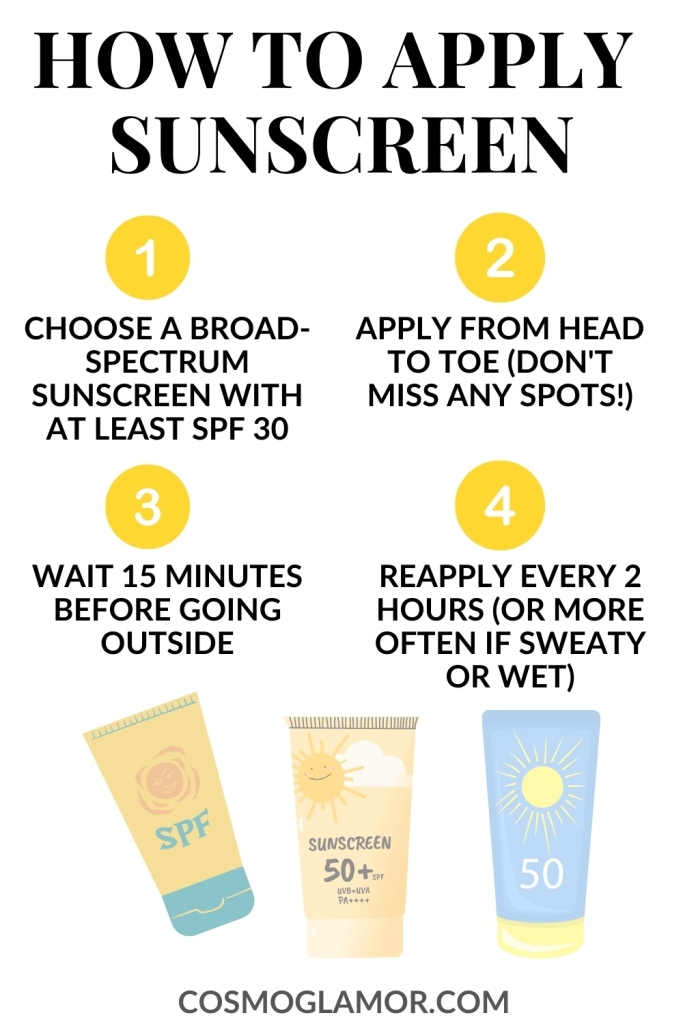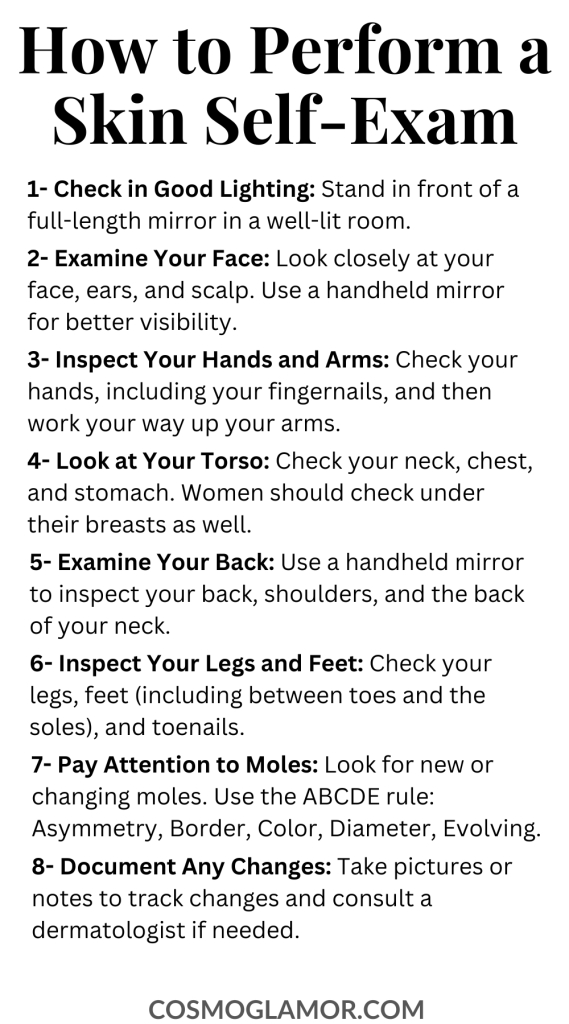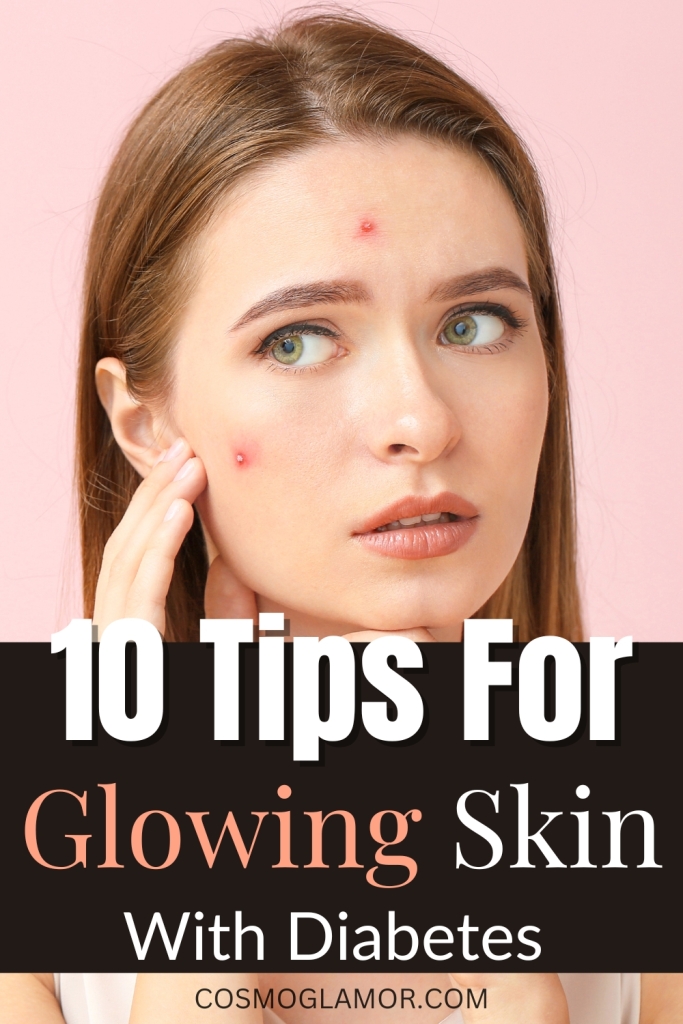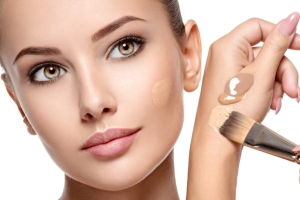Have you ever wondered how some women with diabetes manage to have such luminous skin? It's not magic, and it's certainly not just good genes. While diabetes can present unique challenges to skin health, these women have discovered the secrets to keeping their skin looking its best. They've learned how to navigate the potential hurdles and unlock a vibrant, healthy complexion. Intrigued? Let's explore the 10 glow-boosting skincare tips that every diabetic woman needs to know.
Understanding the Diabetic Skin Challenge
Before we dive into the tips, it's important to understand why diabetes can sometimes make achieving that “glow” a bit trickier.
The Blood Sugar and Skin Connection
High blood sugar levels can affect your skin in ways you might not expect. Imagine this: when sugar molecules linger in your bloodstream, they can attach to the proteins that give your skin its structure – collagen and elastin. This process, called glycation, is like caramelizing sugar on a stovetop. Just as the sugar hardens and becomes less flexible, these proteins become stiff and less able to maintain your skin's youthful appearance. This can lead to dryness, wrinkles, and sagging.
Circulation Concerns
Diabetes can also impact your circulatory system, which is responsible for delivering essential nutrients and oxygen to your skin cells. Think of it like a network of roads that supply your skin with everything it needs to thrive. When this network is compromised, your skin cells may not receive the nourishment they need, leading to a dull complexion and slower healing of wounds.
Increased Infection Risk
High blood sugar can weaken your immune system, making your skin more susceptible to infections. And when infections do occur, they can be more difficult to heal due to impaired circulation and the body's reduced ability to fight off bacteria.
But don't worry! With the right knowledge and a proactive approach, you can overcome these challenges and achieve the radiant skin you deserve.
10 Glow-Boosting Tips for Diabetic Women
1. Blood Sugar Control: The Foundation of Healthy Skin

This might seem obvious, but it's the most crucial step. Keeping your blood sugar levels within your target range is the absolute foundation for healthy skin. Work closely with your healthcare team to manage your diabetes effectively.
-
Why it matters: Remember that glycation process we discussed? Keeping your blood sugar in check helps prevent this damage, protecting your collagen and elastin.
-
How to do it: Follow your doctor's recommendations for medication, diet, and exercise. Regularly monitor your blood sugar levels and make adjustments as needed.
2. Hydration is Key

Think of your skin cells like thirsty little plants. They need water to flourish! Diabetes can make you more prone to dehydration, so it's crucial to drink plenty of water throughout the day.
-
Why it matters: Hydrated skin is plumper, smoother, and more radiant. Dehydrated skin, on the other hand, looks dull and can even become itchy and flaky.
-
How to do it: Carry a water bottle with you and sip on it throughout the day. Aim for at least 8 glasses of water daily, and more if you're exercising or in a hot climate. You can also increase your water intake by enjoying hydrating foods like watermelon and cucumber.
3. Moisturize, Moisturize, Moisturize!

This is a non-negotiable for everyone, but especially for diabetic women. Choose a moisturizer that's specifically formulated for dry skin and apply it liberally after showering and throughout the day as needed.
-
Why it matters: Moisturizer helps to lock in hydration, preventing dryness and creating a protective barrier against irritants.
-
How to do it: Look for moisturizers with ingredients like hyaluronic acid, ceramides, and glycerin. Apply to damp skin after showering to seal in moisture. For an extra boost, consider using a humidifier in your home, especially during the drier months.
Product Recommendation: CeraVe Moisturizing Cream, Cetaphil Moisturizing Lotion
4. Gentle Cleansing is a Must

Harsh soaps can strip your skin of its natural oils, leaving it feeling dry and irritated. Opt for a gentle, pH-balanced cleanser that won't disrupt your skin's delicate balance.
-
Why it matters: Your skin has a natural protective barrier that helps to keep moisture in and irritants out. Harsh soaps can damage this barrier, making your skin more vulnerable.
-
How to do it: Look for cleansers that are fragrance-free and formulated for sensitive skin. Avoid scrubbing too hard, as this can irritate your skin. Instead, use gentle, circular motions to cleanse your face.
Product Recommendation: CeraVe Hydrating Facial Cleanser, Vanicream Gentle Facial Cleanser
5. Sun Protection is Non-Negotiable

Sun damage accelerates aging and can increase your risk of skin cancer. Make sunscreen your best friend, even on cloudy days.
-
Why it matters: UV rays from the sun can damage your skin's collagen and elastin, leading to wrinkles, age spots, and even skin cancer.
-
How to do it: Choose a broad-spectrum sunscreen with an SPF of 30 or higher. Apply liberally to all exposed skin 15-20 minutes before going outside and reapply every two hours, or more often if you're swimming or sweating. Don't forget to protect your lips with a lip balm that contains SPF.
Product Recommendation: EltaMD UV Clear Broad-Spectrum SPF 46, La Roche-Posay Anthelios Melt-in Milk Sunscreen SPF 60

6. Nourish from Within

What you eat plays a huge role in your skin's health. Focus on a balanced diet rich in fruits, vegetables, and whole grains. These foods are packed with antioxidants that help to protect your skin from damage.
- Why it matters: Antioxidants help to fight free radicals, which are unstable molecules that can damage your skin cells.
- How to do it: Fill your plate with colorful fruits and vegetables, lean protein, and healthy fats. Limit your intake of processed foods, sugary drinks, and unhealthy fats. Foods rich in omega-3 fatty acids, like salmon and flaxseed, can also help to keep your skin hydrated and supple.
7. Stress Management for Skin Serenity

Stress can take a toll on your skin, triggering inflammation and breakouts. Find healthy ways to manage stress, such as exercise, yoga, meditation, or spending time in nature.
-
Why it matters: When you're stressed, your body releases cortisol, a hormone that can increase inflammation and oil production, leading to skin problems.
-
How to do it: Incorporate stress-reducing activities into your daily routine. Even a few minutes of deep breathing can make a difference. Consider trying mindfulness techniques or listening to calming music to help you relax and de-stress.
8. Regular Skin Checks are Essential

Diabetes can increase your risk of certain skin conditions, so it's important to be vigilant. Perform regular self-exams and see a dermatologist for professional skin checks at least once a year.
-
Why it matters: Early detection of skin problems is crucial for effective treatment.
-
How to do it: Examine your skin from head to toe once a month, looking for any new moles, spots, or other changes. If you notice anything unusual, see a dermatologist right away. Pay close attention to areas that are prone to dryness or irritation, such as your feet and legs.

9. Kick the Habit (If You Smoke)

Smoking is one of the worst things you can do for your skin. It constricts blood vessels, reducing blood flow to your skin and accelerating aging.
-
Why it matters: Smoking deprives your skin of oxygen and nutrients, leading to wrinkles, dryness, and a dull complexion. It can also hinder wound healing, which is already a concern for people with diabetes.
-
How to do it: If you smoke, talk to your doctor about ways to quit. There are many resources available to help you kick the habit for good, including nicotine replacement therapy, medication, and support groups.
10. Listen to Your Skin

Your skin is constantly communicating with you. Pay attention to any changes or concerns, and don't hesitate to seek professional advice from a dermatologist.
-
Why it matters: Your skin is a reflection of your overall health. By listening to your skin and addressing any concerns promptly, you can help to maintain its health and radiance.
-
How to do it: Be aware of any new or changing moles, spots, rashes, or other skin concerns. If you have any questions or concerns, don't hesitate to consult a dermatologist. Keep a journal to track any changes in your skin or any new products you're using.
Building on the Basics: Advanced Glow-Up Strategies
Once you've established a solid foundation with the essential skincare tips, you might be ready to explore some more advanced strategies to elevate your skincare game and enhance your glow. These strategies involve incorporating specific ingredients that can address particular skin concerns and promote a more youthful, radiant complexion. However, it's important to introduce these ingredients gradually and pay close attention to how your skin responds.
The Power of Retinoids

Retinoids, derived from vitamin A, are true skincare heroes. They can help to increase collagen production, reduce the appearance of wrinkles, and even out skin tone. However, they can also cause dryness and irritation, especially when you first start using them.
-
Why they matter: Retinoids are one of the most effective anti-aging ingredients available. They work by increasing cell turnover, which helps to reveal smoother, brighter skin.
-
How to incorporate them:
- Start slow: Begin with a low concentration of retinol (around 0.01% or 0.03%) and apply it just once or twice a week in the evening.
- Gradual increase: Gradually increase the frequency and strength as your skin adjusts, but always listen to your skin. If you experience excessive dryness or irritation, reduce the frequency or concentration.
- Nighttime application: Always apply retinoids at night and use sunscreen during the day, as they can make your skin more sensitive to the sun.
Important Note: If you're pregnant or breastfeeding, consult your doctor before using retinoids.
Product Recommendation: RoC Retinol Correxion Deep Wrinkle Night Cream, Olay Regenerist Retinol 24 Night Moisturizer
Exfoliation for Radiant Skin

Exfoliation helps to remove dead skin cells, revealing the fresh, glowing skin underneath. But be gentle! Harsh scrubs can irritate your skin, especially if you have diabetes. Opt for a chemical exfoliant with alpha-hydroxy acids (AHAs) like glycolic acid or lactic acid, or beta-hydroxy acids (BHAs) like salicylic acid.
-
Why it matters: Dead skin cells can build up on the surface of your skin, making it look dull and rough. Exfoliation helps to slough off these cells, revealing smoother, brighter skin and allowing your other skincare products to penetrate more effectively.
-
How to incorporate it:
-
- Choose the right type: Select a chemical exfoliant with AHAs or BHAs and follow the product instructions carefully.
- Start slow: Start with a low concentration and gradually increase the frequency as your skin tolerates it. It's usually recommended to exfoliate once or twice a week, but you may need to adjust this based on your skin's sensitivity.
- Moisturize after: Always moisturize after exfoliating to keep your skin hydrated.
Product Recommendation: The Ordinary Glycolic Acid 7% Toning Solution, Paula's Choice Skin Perfecting 2% BHA Liquid Exfoliant
Hyaluronic Acid: Your Hydration Hero

Hyaluronic acid is a humectant, meaning it attracts and holds onto moisture like a sponge. It's a fantastic ingredient for hydrating dry, diabetic skin.
-
Why it matters: Hyaluronic acid can hold up to 1000 times its weight in water, making it a powerful hydrator for your skin. It can help to plump up your skin, reducing the appearance of fine lines and wrinkles.
-
How to incorporate it: Look for serums or moisturizers containing hyaluronic acid and apply them to damp skin after cleansing. You can also find hyaluronic acid in sheet masks and other hydrating treatments.
Product Recommendation: The Ordinary Hyaluronic Acid 2% + B5, Neutrogena Hydro Boost Water Gel
Vitamin C for Brighter Skin

Vitamin C is a potent antioxidant that can help to protect your skin from damage, brighten your complexion, and even out skin tone.
-
Why it matters: Vitamin C helps to neutralize free radicals, which can damage your skin cells and contribute to aging. It can also help to stimulate collagen production, leading to firmer, more youthful-looking skin.
-
How to incorporate it: Look for serums or moisturizers containing vitamin C (often listed as L-ascorbic acid) and apply them in the morning before sunscreen. Vitamin C can be unstable, so choose products that are packaged in opaque containers to protect them from light and air.
Product Recommendation: Skinceuticals C E Ferulic, Mad Hippie Vitamin C Serum
A Holistic Approach to Glowing Skin
Remember, achieving glowing skin is not just about what you put on your face. It's about taking a holistic approach that includes managing your diabetes, eating a healthy diet, staying hydrated, managing stress, and protecting your skin from the sun.
Think of your skincare routine as a form of self-care. It's a time to pamper yourself and show your skin some love. And when you take care of your skin, you're not just improving your appearance, you're also boosting your confidence and overall well-being.
“Since I started prioritizing my skincare and managing my blood sugar, I feel like I'm glowing from within,” says Sarah, a 45-year-old woman with type 2 diabetes. “My skin is smoother, more hydrated, and I feel so much more confident.”
Maria, a 38-year-old with type 1 diabetes, adds, “I used to struggle with dry, itchy skin, but since I started using a gentle cleanser and a good moisturizer, my skin has transformed. I also make sure to drink plenty of water and manage my stress levels, which has made a huge difference.”
While diabetes can present some unique challenges to skin health, it doesn't have to hold you back from achieving a radiant glow. By following these tips and working closely with your healthcare team, you can unlock your skin's full potential and radiate confidence from the inside out.
Resources:
-
Skin care for diabetic patients: a review (Clemens, et al., 2019) – This review explores the various skin conditions associated with diabetes and emphasizes the importance of proper skincare routines, including gentle cleansing and moisturizing, to maintain skin health and prevent complications.
-
Diabetes Mellitus and Skin: A Review of the Dermatologic Manifestations of Diabetes Mellitus (Yosipovitch, et al., 2003) – This comprehensive review discusses the diverse skin manifestations associated with diabetes, highlighting the underlying mechanisms and potential treatments.
-
Skin Barrier Function in Diabetes Mellitus (Loden, et al., 2017) – This study investigates the impaired skin barrier function in individuals with diabetes, which contributes to dryness and increased susceptibility to infections. It emphasizes the importance of restoring and maintaining the skin barrier for optimal skin health.
-
The impact of glycation on skin dryness and barrier function in diabetic patients (Danby, et al., 2015) – This research delves into the specific effects of glycation on skin health in diabetic patients, demonstrating how it contributes to dryness and compromised barrier function.
-
Efficacy and safety of a topical antioxidant regimen in conjunction with a sunscreen in patients with diabetes mellitus (Hsia, et al., 2009) – This study examines the benefits of using topical antioxidants, such as vitamin C, in combination with sunscreen to protect the skin of diabetic patients from oxidative stress and sun damage.
-
The role of retinoids in the treatment of skin aging (Mukherjee, et al., 2006) – This review article provides a comprehensive overview of the use of retinoids in anti-aging skincare, discussing their mechanisms of action and clinical efficacy in reducing wrinkles and improving skin texture.
-
Moisturizers for the treatment of xerosis (Rodrigues, et al., 2011) – This review explores the role of moisturizers in managing dry skin (xerosis), a common concern for diabetic patients. It discusses the different types of moisturizers and their mechanisms of action in hydrating and protecting the skin.
-
Stress and skin disorders: A review (Chen, et al., 2014) – This review investigates the link between stress and various skin conditions, highlighting the impact of stress on skin inflammation and immune function. It emphasizes the importance of stress management for maintaining healthy skin.







